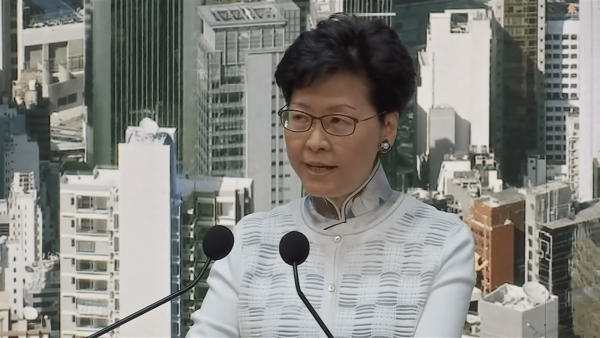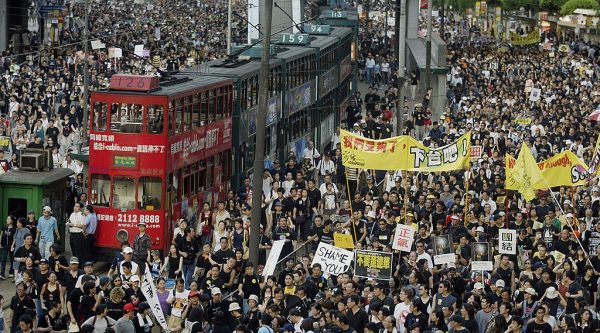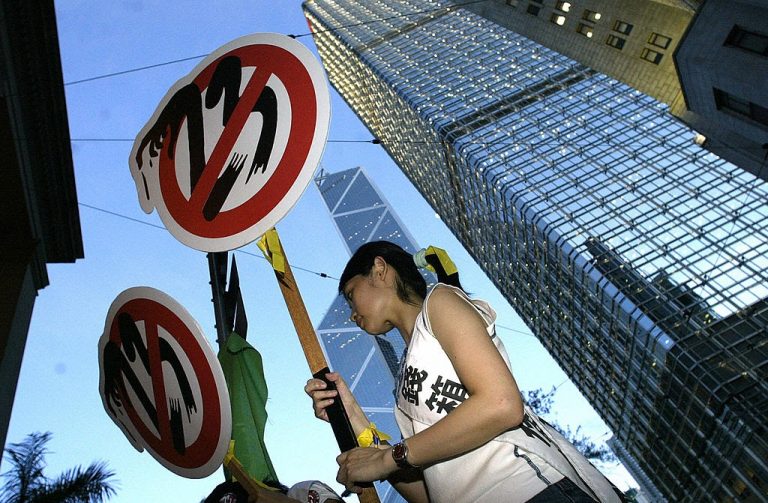A long-dormant piece of legislation in Hong Kong’s Basic Law may be brought into action as the mainland Chinese regime tightens its political grip over the bustling port and financial hub.
Multiple Hong Kong officials, including its chief executive Carrie Lam, have made mention of Article 23, a piece of the Basic Law that requires the former British colony to “enact laws on its own” to prohibit acts of “treason, secession, sedition, [or] subversion” against the mainland Chinese government.
Hong Kong was returned from British colonial rule to Chinese sovereignty in 1997, a handover that took place under the terms of a 1984 agreement that the city would retain internal political freedom and rule of law until 2047. The Basic Law serves as Hong Kong’s local constitution, guaranteeing many rights that do not exist on the communist-ruled mainland.
Hong Kong’s leaders, despite being installed by the Chinese Communist Party (CCP), have so far only attempted to legislate Article 23 one time, in 2003. But the law, which is widely criticized as a way for the CCP to extend its dictatorship to Hong Kong, prompted 500,000 people to march in protest that year, compelling the authorities to shelve their plans for what was lambasted as an “evil law.”
Growing regime demand to implement an ‘evil law’
Eighteen years later, two-plus decades of efforts by the CCP and its supporters to undermine Hong Kong’s status have largely mooted the promise of “one country, two systems.” After massive protests in 2019 and 2020, mainland China’s Party-controlled National People’s Legislature imposed a strict “National Security Law” (NSL) on Hong Kong, effectively banning many types of expression.
Success
You are now signed up for our newsletter
Success
Check your email to complete sign up
Though frequently compared with Article 23, the NSL is less precise in its language and does not explicitly ban as many activities. As described by the South China Morning Post (SCMP), “Offences yet to be addressed include treason, sedition, theft of state secrets, a ban on foreign political organisations or bodies from conducting political activities in the city and local political bodies from establishing ties with their foreign counterparts.”
Carrie Lam, the deeply unpopular chief executive who was installed with Beijing’s approval in 2017, has brought up Article 23 on several recent occasions, including last December when she said that the legislation was being worked on, as well as last May when she expressed disappointment that Article 23 had not yet been activated. This June, Lam said that the legislation was not likely to be completed by the end of her term in 2022.

Apart from Lam herself, recently promoted officials, including administrative chief John Lee, who was previously the city’s security head, and his replacement, Hong Kong Police Chief Chris Tang, spoke of the need to implement Article 23 as soon as possible. Pro-Beijing figures, such as vice-chairman of the CCP-controlled Chinese Association of Hong Kong and Macau Studies Lau Siu-kai, and lawmaker Priscilla Leung Mei-fun, also expressed support for the legislation.
Zhang Yong, a mainland official and vice-chairman of the Basic Law Committee, said that “while Hong Kong’s Crimes Ordinance covered some aspects of national security, such as treason and sedition, it had not yet been updated to reflect the change of sovereignty [from the UK],” as reported by SCMP.
Tightening the screws
Unlike the NSL, which focuses on speech and expression deemed harmful, Article 23 also prohibits “foreign political organisations or bodies from conducting political activities” or working with foreign political organizations.
According to Hong Kong Free Press (HKFP), when the Basic Law was drafted in 1989 it did not contain a mention of subversion. However, after the Tiananmen Square Massacre, the CCP sought to expand the law’s reach.

Article 7 of the NSL states, “The Hong Kong Special Administrative Region shall complete, as early as possible, legislation for safeguarding national security as stipulated in the Basic Law of the Hong Kong Special Administrative Region and shall refine relevant laws.”
From the perspective of Party officials looking to control dissent in Hong Kong, it would seem that no additional legislation needs to be passed in light of the NSL already being enacted.
And the NSL isn’t the only legislation that has been enacted based on Article 23. In 1997 before the handoff, the Colonial Legislative Council passed the Official Secrets Ordinance, which controlled the release of restricted information. After Hong Kong was handed over to the People’s Republic of China, the mainland-controlled Provisional Legislative Council updated the Societies Ordinance, banning political groups from affiliating with overseas or Taiwanese counterparts.
Legislation based on Article 23 could further tighten the screws on Hong Kong’s vanishing freedoms, even beyond the NSL, which at the time of writing appears to have been applied selectively in the city.
Ng said the definition of items such as treason, subversion, and secession were vaguely defined. Like the NSL, the offenses also carried a maximum penalty of life in prison.
Ng said the attempt to import the persecution and other erosions of freedoms brought tremendous international attention, “It was not only Hong Kong civil society, but [the bill also attracted] international attention, especially international legal bodies, who were very concerned because there had just been anti-terrorism laws that greatly infringed on freedoms in their own countries…The English Bar, the Canadian Bar, the New York Bar and so on.”
Pro-democracy activists and the independent tabloid, Apple Daily, have found themselves quashed by the NSL. However, SCMP reported that according to Lau, “the mechanism in safeguarding national security would not be considered exhaustive as long as Article 23 was not enacted.”
Despite the Hong Kong and mainland authorities’ toughening stance in the city, some groups haven’t been affected directly. Adherents of Falun Gong, the popular spiritual practice that is banned and persecuted in mainland China, exercise their faith openly in Hong Kong. The Epoch Times, a newspaper founded by Falun Gong practitioners known for its criticism of the communist regime, has suffered several attacks by masked assailants, but has not been targeted under the NSL.
According to insiders and analysts, the CCP’s 2003 attempt to implement Article 23 was primarily aimed at extending the persecution of Falun Gong — a harrowing repression started on the mainland by then-CCP leader Jiang Zemin in 1999 — to Hong Kong. Current Party head Xi Jinping has demonstrated less enthusiasm for Jiang’s vendetta against Falun Gong; though the persecution still continues, many senior Chinese officials tasked with its implementation have been arrested for corruption.
Xi’s feud with the still-powerful Jiang faction and his increasing authoritarianism have fed deep splits in the Communist Party, a struggle that is reflected in the Hong Kong bureaucracy.
Neil Campbell contributed to this report.












